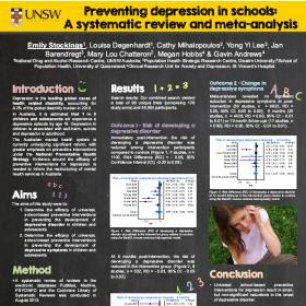Abstract
Background: Depression in children imparts significant burden and is associated with self-harm, suicide and depression in adulthood.
Objectives: To determine whether universal school-based interventions are effective in preventing the onset of depression in children and adolescents.
Methods: A systematic review of reviews was conducted in August, 2013 using the electronic databases PubMed, Medline, PSYCINFO and the Cochrane Library of Systematic Reviews. Randomised controlled trials examining the efficacy of psycho-educational depression prevention programs conducted in school settings among young people (aged 5-18) without a current mental disorder were eligible for inclusion. Data were synthesised using the MetaXL inverse variance heterogeniety model.
Results: A total of 96 unique trials and 45,904 participants were included in the analysis. The risk of having a depressive disorder was reduced compared to no intervention at post-test (7 studies, 1100 participants, risk difference (RD) = -0.06, 95% confidence interval (CI): -0.20 to 0.08), 6-months (8 studies, 532 participants, RD = -0.03, 95% CI: -0.09 to 0.02) and12-months (7 studies, 1158 participants, RD = -0.01, 95% CI: -0.07 to 0.04), however this did not reach statistical significance. Meta-analyses revealed no significant reduction in depressive symptoms at post-intervention (38 studies, 8822 participants, RD = 0.00, 95% CI: 0.00 to 0.00); 6 months (25 studies, 4428 participants, RD = 0.00, 95% CI: - 0.01 to 0.01) or 12-month follow-ups (17 studies, 5160 participants, RD = 0.00, 95% CI: - 0.01 to 0.01).
Conclusions: There is some evidence that universal school-based prevention programs may prevent the onset of depression among children and adolescents in the short term, however further studies are needed to determine if this approach is cost-effective.
Implications/target audience: Routine implementation of universal depression prevention programs in school settings may help reduce the burden of depressive disorders through a reduction in incidence. These results are relevant to policy makers, mental health clinicians and educational representatives.


